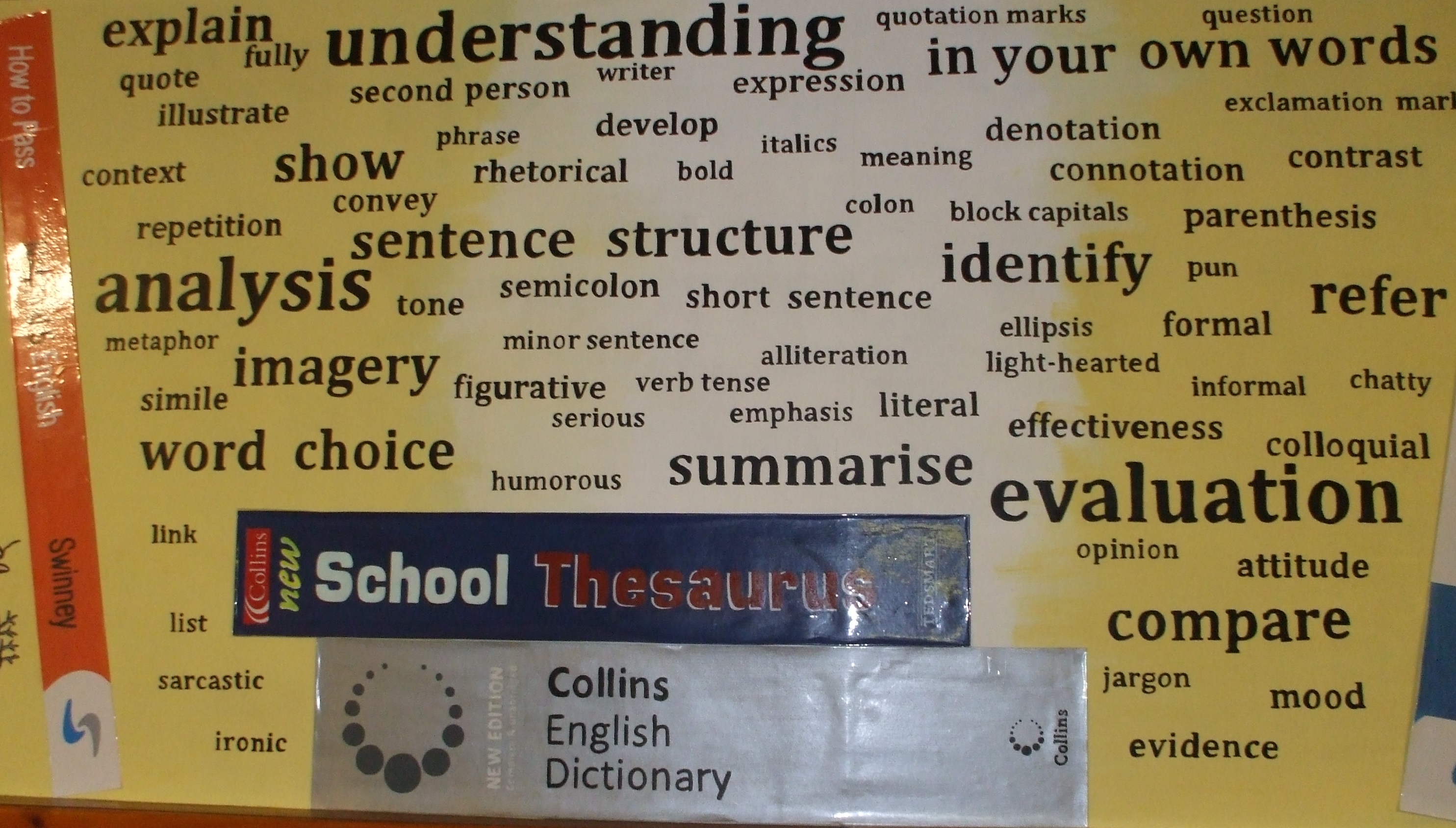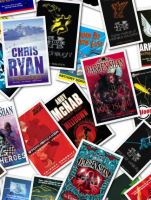~~~~~~~~~~~~~~~~~~~~~~~~~~~~
If you are nostalgic for the now defunct Standard Grade you can click here for a reminder of what the course and exams looked like.
~~~~~~~~~~~~~~~~~~~~~~~~~~~~~~~~~
The information contained here relates specifically to Close Reading at Intermediate level. Whilst the questions are worded differently at National 5 and Higher and there is a shift in the skills being assessed the information remains useful. Click here for more information.
NATIONAL 5
Check out the BBC webpages for information on National 4 and 5 English.
National 4: http://www.bbc.co.uk/education/subjects/zx4cwmn
National 5: http://www.bbc.co.uk/education/subjects/zmcrd2p
The Scottish Set Text
Click here for the list of Scottish Texts.
The National 5 Portfolio
The following information can be found on the SQA website. The portfolio essays account for 30% of your final mark. (Each essay is worth 15 marks.) This is 30% that you can control. There is little sense in ignoring deadlines set by your school and/or teacher and handing in drafts at the last minute or late. The rules regarding plagiarism and word limits must be adhered to. You should be clear about what is expected of you.
Click here to see how the marks are awarded for the discursive essay and the creative essay.
Nat 5 Portfolio
This portfolio will give learners an opportunity to demonstrate the following skills, knowledge and understanding:
- writing in different genres
- writing for a range of purposes and audiences
The portfolio will have 30 marks out of a total of 100 marks. This is 30% of the overall marks for the Course assessment. The Course will be graded A–D.
The portfolio will comprise the production of two written texts that address the main language purposes, namely creative and discursive writing. One text will be broadly creative and the other broadly discursive.
The pieces of writing should each be of no more than 1,000 words.
Types of writing
The candidate will produce two pieces of writing for the portfolio drawn from the genres identified in Group A and Group B.
One should be drawn from group A and one from group B.
Group A: Broadly creative
a personal essay/reflective essay
a piece of prose fiction (eg short story, episode from a novel)
a poem or set of thematically linked poems
a dramatic script (eg scene, monologue, sketch)
Group B: Broadly discursive
a persuasive essay
an argumentative essay
a report for a specified purpose
a piece of transactional writing
Up to fifteen marks will be awarded for each essay chosen for the portfolio.
This portfolio is:
- set by Centres within SQA guidelines
- conducted under some supervision and control
Evidence will be submitted to SQA for external marking.
All marking will be quality assured by SQA.
This assessment will be carried out over a period of time. Candidates should start at an appropriate point in the Course: this will normally be when they have completed most of the work on the Units in the Course.
This assessment has two stages:
- a portfolio planning and development stage which should be completed over a period of time
- a writing stage
The written texts must be of no more than 1,000 words each, but full marks can be achieved in a shorter piece, if appropriate to purpose.
While the assessor will have a supporting role, the candidate should take the initiative in the planning, management and completion of the task.
Reasonable assistance may be provided prior to the formal assessment process taking place. The term ‘reasonable assistance’ is used to try to balance the need for support with the need to avoid giving too much assistance. If any candidates require more than what is deemed to be ‘reasonable assistance’, they may not be ready for assessment or it may be that they have been entered for the wrong level of qualification.
Reasonable assistance may be given on a generic basis to a class or group of candidates, for example, advice on how to find information for a discursive essay. It may also be given to candidates on an individual basis.
It is acceptable for the assessor or a third party to provide:
- an initial discussion with the candidate on the selection of the topic leading to an outline plan
- oral or written suggestions for improvements to a first draft
Once work on the assessment has begun, the candidate should be working independently.
There are no restrictions on the resources to which candidates may have access, for example, spellcheckers and dictionaries.
Assessors should not provide specific advice on how to re-phrase or improve responses, or provide model answers specific to the candidate’s task. It is not acceptable for the assessor to provide key ideas, to provide a structure or plan, to suggest specific wording or to correct errors in spelling and/or punctuation. This would go beyond reasonable assistance.
The final writing of both pieces will be conducted under some supervision and control. This means that although candidates may complete part of the work outwith the learning and teaching setting, assessors should put in place processes for monitoring progress to ensure that the work is the candidate’s own, and that plagiarism has not taken place. In the final writing stage this need not entail formal, timed and supervised conditions, but at all stages of the preparation for and the production of the piece there should be careful monitoring to ensure that it is entirely the candidate’s work.
Mechanisms to authenticate candidate evidence could include:
- regular checkpoint/progress meetings with candidates
- short spot-check personal interviews
- checklists which record activity/progress
- an accurate record of sources consulted
Any direct quotations from source material used in discursive writing must be clearly acknowledged by the use of quotation marks. Specific details of sources must be given – eg dates and writers of newspaper articles, specific web pages, titles and dates of publication of books; it is not acceptable to say, for example, “various newspaper articles” or “environmental websites” or “the internet”. Unacknowledged use of others’ material such as copying and pasting from the internet or any other source, or re-wording or summarising information from another source and passing it off as the candidate’s own, is plagiarism and this carries severe penalties.
Assessors must exercise their professional responsibility in ensuring that evidence submitted by a candidate is the candidate’s own work.










Leave a comment